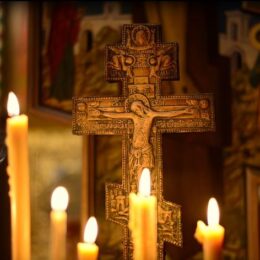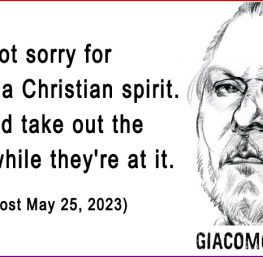From the Touchstone Blog:
Maureen Dowd from her column in today’s editions of The New York Times on the election of Joseph Cardinal Ratzinger as Pope Benedict XVI:
“For American Catholics – especially women and Democratic pro-choice Catholic pols – the cafeteria is officially closed.”
While good Christians will disagree with Ms. Dowd about the exclusion of “women” during the new papacy (do any of the women in this AP photo‹nuns, teenagers, mothers, etc.‹seem left out to you?), so far as the closing of the American Catholic Cafeteria, pan-orthodox Christians (whether Protestant, Orthodox or Catholic) can respond with a hearty “Amen.” We never liked the food from that joint anyway.
“The Cafeteria is Closed” might serve as the new motto for the Ratzinger Fan Club.
–Kenneth Tanner




Christ Matthews and the Disciplined Nun
Chris Matthews saw fit to give a platform to a Roman Catholic nun who had been disciplined by then Cardinal Ratzinger. The terms that Matthews used throughout the program were emotionally loaded and twisted.
For example, Matthews stated that nun had been the disciplined as a result of then Cardinal Ratzinger’s policy to “suppress dissent.” People unfamiliar with Ratzinger’s past might not know that it was his EXPRESS ROLE to enforce adherence to traditional doctrine. It was his role to suppress HERESY within his Church. Matthew’s language ignores the fact that the Roman Catholic Church is a collection of people who are brought together by the fact that they all profess belief the SAME DOCTRINE. You may or may not join them in those beliefs but that is what ties them together ultimately. Additionally Matthews inappropriately uses the language of democratic government. Under the American Constitution citizens have free speech rights, it would be unconstitutional and unAmerican to “suppress dissent.” These ideas do not apply to a religious group, they simply don’t make sense. People who do not believe in the doctrine of the Roman Catholic Church are free to leave or to join other religious communities. The Church may decide that people who hold official positions in their organization, such as the nun did, must profess and spread the official doctrine of the Church. The Church need not support and give authority to people who are working against the acceptance of the Church’s official doctrine.
After a few minutes Matthews gave the nun an opportunity to describe what she though John Paul II or Benedict the XVI should do. She stated that she thought then Cardinal Ratzinger had offended the principle of collegiality. Her view was that Ratzinger had “treated Bishops like alterboys.” Apparently Ratzinger actually exercised the authority of his official position.
The nun gave her advice to the Roman Catholic Church. The Pope should listen to the Bishop’s ideas on theology, the Bishops should listen to the Priests ideas on theology, the priests should listen to the parishioners ideas on theology.Essentially, she turned everything on its head. Authority to define theological doctrine would rise up from the parishioners and be carried upward to the Pope.Again, this might be a good model for secular democratic government, it doesn’t apply to a Church based on divine revelation. Interestingly enough the nun actually stated that the source of the parishioners ideas on theology was the parishioner’s “inner authority.” I think this makes this woman a pagan. She seems to still be a nun, still living off parishioners tithes.
Of course, it came out in the conversation that this nun was advocating renunciation of the Church’s condemnation of homosexual conduct. Christ Matthews described the matter thusly…. “Sister So-n-So was told to stop ministering to gay people.” This suggests that the nun had been counseling gay people on religious matters and had been told to slam the door in their face. What the nun had in fact been doing was encouraging the acceptance of openly homosexual conduct by parishioners and ultimately priests. The nun suggested that the Church’s objection to homosexual conduct was that it wasn’t “open to the creation of life.” Which is only partially true, the objection is more than that, the objection set out in Romans is based on the rejection of same-sex relations as a rebellion against God’s plan for humanity.
Needless to say,this is one of those Catholics who find the selection of Benedict the XVI “divisive.”
Which always confuses me. I mean, what’s wrong with division? The truth is, and should be, divisive, dividing those who understand and believe it from those who balk at even accepting that there IS a truth.
Not So Dumb Brit
Aren’t numerous parables involving “wheat and chaff” and “sheep and goats” must mean something?
Not sure what you meant with ‘not so…’ We seem to be on the same page here. Division isn’t necessarily a bad thing. Our good Lord Himself continually referred to division by means of the parables you mentioned.
Clumsy Wording, Will Do Better
I realize now that you could read the words “Not So Dumb Brit” two ways. You described yourself as “Dumb Brit.” My wording was meant to challenge the idea that you are dumb. So, I wrote “Not So” to qualify “Dumb.” Let me give you another example, Americans will say “Not So Dumb, Heh?” to mean that something or someone is actually smart. Americans will also say “Not so Smart, Heh?” to mean that something or someone is actually stupid or foolish. This is a long way of saying that I thought you were a “Not So Dumb Brit” or a “Smart Brit.”
You thought that I meant the first two words “Not So” to signal my disagreement with you, whom I identified as “Dumb Brit.” Does this make sense. I do, in fact, agree with you. You will occaisionally read of people that reject the idea that a loving God or Jesus would, in the end, actually consign someone to Hades. But there are many parables where Jesus talks about God ultimately dividing people according to their spiritual state. The OT is full of references about the wisdom of fearing God as is the NT. Now, I need to stop here because I have only a shaky and thin layman’s understanding of Scripture. Best to ask the expert’s on this board about these matters.
Sorry for the confusion. As Churchill said: “Two countries divided by a common language!” 😉
Ahhhh. I see. Thankyou Missourian.
Actually, the name Dumb Brit is a twofold device I employ. One, it’s a leftover from my days on http://www.bolt.com, where it was a sort of nickname for me, and Two, I find life is so much easier when people start off thinking of me as dumb. If I do say something dumb, they’ve no right to criticise as they were warned. If I say something clever, so much the better.
I agree with you on the damnation business, too. With Lewis, I say that there is no doctrine of our Lord’s which I’d more willingly remove if I could, but also that it’s one of the most impossible to remove. (Problem of Pain, I think) Also interesting is the point that ‘[the misconception that Jesus preached a kindly and simple religion, and that St Paul afterwards corrupted it into a complicated and cruel religion] is really quite untenable. All the most terrifying texts come from the mouth of Our Lord: all the texts on which we can base such warrant as we have that all men will be saved some from St Paul”
Of course, if you try quoting anything but pure Scripture at some people, they’ll just shoot you down. No respect for tradition or great thinkers and theologians. Meh.
For the record: Orthodoxy teaches that the fire of hell is the torment of the love of God towards a person who does not want God’s love. Whether the love burns or purifies depends on our orientation to God, which also determines if God is Judge or Father. (If we hate God (or hate our brother — same thing)), then we will end up hating God as well. And since we can never escape God’s love (Psalms: I was in hell and you were there), particularly after the Judgement, we will seek to flee far from it — into the outer darkness in fact, which is a place of complete isolation. Another way of putting this: there is no way to extinguish the divine spark. It exists into eternity.
See: River of Fire. Some of the piece is too polemical, too judgemental of Western theology in places, IMO. Nevertheless, it is a reliable piece for the most part.
Fr. Hans,
You know I’m a Scripture guy, not a theologian, so please correct me if I’m wrong… I’m under the impression that God judges all, just as He is Father to all. The distinction, it seems to me, isn’t between God’s roles, but between the results of His justice. Did you mean “which also determines whether we experience/know God as Judge or Father”?
Note 7: This is probably the most coherent and rational explanation, one which I’ve read in Merton as well. It makes sense. I can think of numerous instances where doing the right thing was inconvenient, uncomfortable or downright painful. I can likewise think of circumstances where doing what’s not right comes easy, almost naturally. Yet, love in its truest sense is hard for many of us. At least when it comes to putting it into practice ourselves, even though we expect nothing less from everyone else!
Yet it’s that stubborn resistance towards self-sacrifice that I feel we’re called to choose to overcome in some small fashion every day.
Yes, that’s exactly what I meant (but said poorly). God is constant, unchanging, we are not. In fact, we are directed into change (repentance), and whether or not the orientation is repentance (metania – change of mind) determines whether we experience/know God as Judge or Father, just as you say.